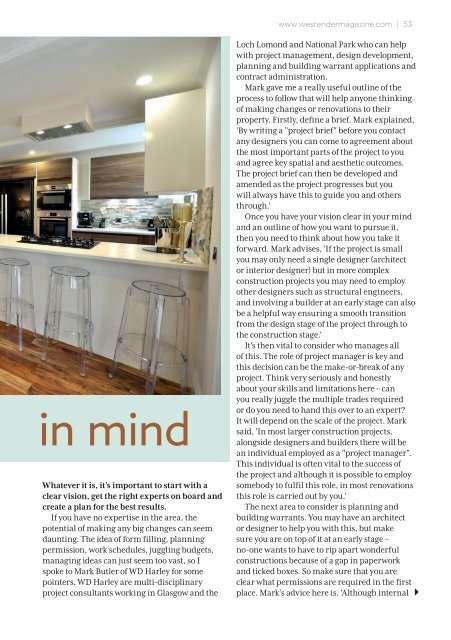WebMayJun2019
high quality lifestyle magazine for the west end of Glasgow
high quality lifestyle magazine for the west end of Glasgow
Create successful ePaper yourself
Turn your PDF publications into a flip-book with our unique Google optimized e-Paper software.
www.westendermagazine.com | 53<br />
in mind<br />
Whatever it is, it’s important to start with a<br />
clear vision, get the right experts on board and<br />
create a plan for the best results.<br />
If you have no expertise in the area, the<br />
potential of making any big changes can seem<br />
daunting. The idea of form filling, planning<br />
permission, work schedules, juggling budgets,<br />
managing ideas can just seem too vast, so I<br />
spoke to Mark Butler of WD Harley for some<br />
pointers. WD Harley are multi-disciplinary<br />
project consultants working in Glasgow and the<br />
Loch Lomond and National Park who can help<br />
with project management, design development,<br />
planning and building warrant applications and<br />
contract administration.<br />
Mark gave me a really useful outline of the<br />
process to follow that will help anyone thinking<br />
of making changes or renovations to their<br />
property. Firstly, define a brief. Mark explained,<br />
'By writing a "project brief" before you contact<br />
any designers you can come to agreement about<br />
the most important parts of the project to you<br />
and agree key spatial and aesthetic outcomes.<br />
The project brief can then be developed and<br />
amended as the project progresses but you<br />
will always have this to guide you and others<br />
through.'<br />
Once you have your vision clear in your mind<br />
and an outline of how you want to pursue it,<br />
then you need to think about how you take it<br />
forward. Mark advises, 'If the project is small<br />
you may only need a single designer (architect<br />
or interior designer) but in more complex<br />
construction projects you may need to employ<br />
other designers such as structural engineers,<br />
and involving a builder at an early stage can also<br />
be a helpful way ensuring a smooth transition<br />
from the design stage of the project through to<br />
the construction stage.'<br />
It's then vital to consider who manages all<br />
of this. The role of project manager is key and<br />
this decision can be the make-or-break of any<br />
project. Think very seriously and honestly<br />
about your skills and limitations here – can<br />
you really juggle the multiple trades required<br />
or do you need to hand this over to an expert?<br />
It will depend on the scale of the project. Mark<br />
said, 'In most larger construction projects,<br />
alongside designers and builders there will be<br />
an individual employed as a "project manager".<br />
This individual is often vital to the success of<br />
the project and although it is possible to employ<br />
somebody to fulfil this role, in most renovations<br />
this role is carried out by you.'<br />
The next area to consider is planning and<br />
building warrants. You may have an architect<br />
or designer to help you with this, but make<br />
sure you are on top of it at an early stage –<br />
no-one wants to have to rip apart wonderful<br />
constructions because of a gap in paperwork<br />
and ticked boxes. So make sure that you are<br />
clear what permissions are required in the first<br />
place. Mark’s advice here is, 'Although internal














